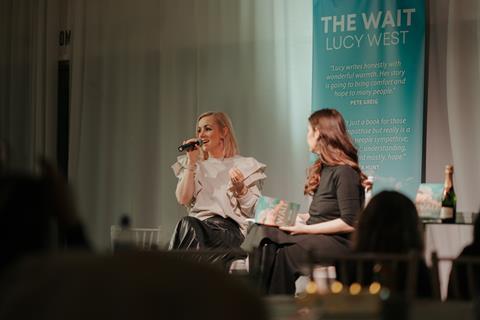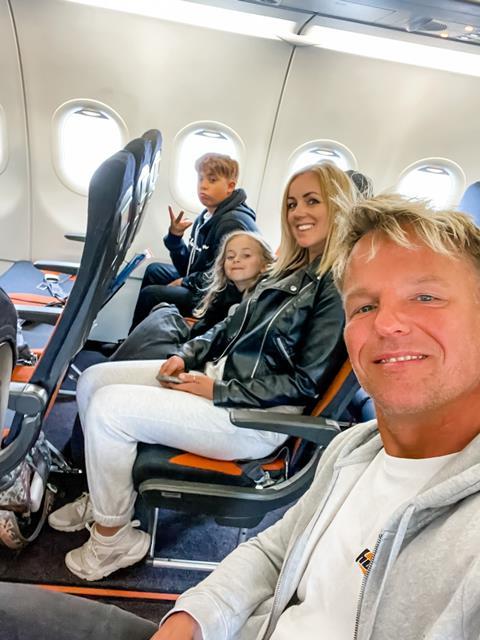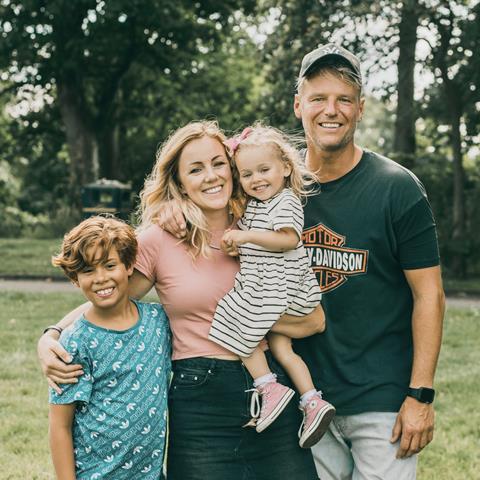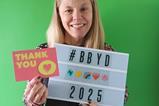Lucy West (née Britten) carved out her singing career in Christian bands like V*Enna, BlushUK and LZ7, performing songs and sharing the gospel with countless young people. She’s now using her voice in another way – to talk about infertility

At 19, Lucy had never sung in public before. Her sister persuaded her to record some vocals for a demo and, in that moment, something was ignited: “I remember this feeling inside of me that I’d never felt before and thinking, ‘Oh my gosh, this is who I am.’” At the time, she was studying to become a primary school teacher, but something had shifted: “This one event changed my whole life. I went back to university in Plymouth absolutely convinced that I needed to sing.” She started singing at church, and was invited to join a friend’s band, and “it just went on and on from there”.
Approached to form a new band in Manchester, Lucy soon crossed paths with Lindz West, who had recently joined The Tribe (at the time known as The World Wide Message Tribe). She was on holiday when a friend from the group texted to say: “I think this is your man, see what you think when you get back.” She met Lindz a week and a half later: “Funnily enough I thought; nah, he’s blond and I’ve asked God for a tall dark handsome man…I completely wrote him off!”
They had lots in common and were both happy in their careers: “We were doing quite a lot of travelling at the time…We were both on stage and both loving it.” Popping out to the pub or cinema as friends, it didn’t take long for their relationship to blossom: “It was quite quick…we got together and were engaged within two and a half months. We knew we were going to get married before we even made it official; 23 years later we’re still in love, and more than ever now because we’ve been through so much together.”
Dreams of a family evaporate
Lucy always imagined having a big family. Growing there were “big numbers around the table”; in 30 years her parents fostered 107 children, babies and young adults. They adopted her younger brother and sister adding to their three ‘homemades’ (as her mum calls Lucy and the two other children she birthed herself).
When the time came, Lucy assumed getting pregnant would be straightforward: “You get married, you have children and that’s how it is.” But theirs would be a different story, though she says “we never dreamt for a moment it would be so different”.
My body was messing up on the one thing that I wanted it to do
A few months into trying for children, worry had already crept in: “‘Hold on a minute’, I thought. Everyone said you just start trying and then it’s there – boom.” After a year she and Lindz decided it was time to get tested, which felt like a relief: “When we finally started getting tests done we were like, phew – it’s all going to be OK now.” They were sure the doctors would ‘sort it out’.
Lucy notes that they were naive about so much: “I was really feeling around in the dark and trying to make sense of what I’d just walked into.” Searching online, she discovered a subculture of people waiting for children, all going through deep pain and loss: “I went onto a forum and there were people discussing it and I came away absolutely broken, because all I could hear was the brokenness of other people wanting children. It was all women desperately listing all the details of what they’d done that month to try and get pregnant…it was heartbreaking.” It stopped her in her tracks. She thought: “I’ve got to find somewhere else to learn about this.” But what she found didn’t help, as “it was all scientific, or complete doom and gloom”.

The struggles of the journey
They decided to embark on IVF, which turned out to be “a real rollercoaster”. She explains: “There were days when I would just feel so much hope. I’d think, ‘This is so exciting! I’m doing something at last to get me a step closer to my dreams.’ But then we’d go for a meeting and I’d hear nurses say that the eggs weren’t developing quickly enough, and they’d comment: ‘If we don’t turn a corner tomorrow we might have to stop.’” This could sometimes be within the space of 24 hours. “I’d go home and just pray my little heart out and then the next day they’d say: ‘Oh OK there has been a bit of movement; let’s keep going.’ So, it was incredibly up and down.”
Lucy writes openly about the emotional toll it took on her; Lindz does too, sharing his perspective in a chapter entitled ‘The Weight’. Discovering how many couples break up as a result of infertility, they made an early decision not to blame each other. Lucy describes regularly “crying it all out”, and feeling she’d completely lost herself. But she kept going: “There would be times when I’d wake up in the morning and I’d think, ‘I’ve got to get up’, and I’d have to will my feet out of my bed and just try and stand up straight.” It was hard to reach out for support and share what she was going through: “I didn’t want to admit to anybody I was depressed because it was intermingled with shame and so I didn’t want them to see.”
Distinctions are made between ‘levels’ of loss and infertility
She was frustrated with herself too: “I had this deep sense that I was completely failing and my body was absolutely rubbish, you know it was messing up on the one thing that I wanted it to do.” People would offer her well-meaning advice but it wasn’t helpful. It would cause her to ‘spiral’ and compare herself, sometimes setting her back days. Lucy hopes her book will encourage greater empathy and understanding of all types of grief, and especially that associated with infertility and baby loss.
Lucy admits: “I was really quite mean on myself if I’m honest, because I’d say, ‘Lucy you haven’t lost a baby, you’ve lost the dreams of a baby.’” She has a different view now; the loss of not being able to conceive is proven to be as tangible and devastating as losing a child itself. Lucy describes being aware of “a hierarchy of pain” where distinctions are made between ‘levels’ of loss and infertility. She tended to disqualify herself from receiving the compassion she needed. It still occasionally catches her out so she’s determined to highlight it and bring change.
God’s plan fulfilled
When the second round of IVF failed, Lucy and Lindz were devastated. Even so, they embarked on a third round but were soon told it was pointless to continue. Not having children was Lucy’s “absolute worst fear”. She wanted a family, a legacy, so it was a huge blow. Despite that, this time she felt “more protected from the disappointment”, and knew she’d be OK: “God gave me the grace to survive through it and to have a life after it.” That’s the message she wants to share: “Yes it feels like your whole world is broken but actually you can get through it and you can survive it.”

In writing The Wait, Lucy wanted to provide an alternative way of getting through it, one which offers hope and encourages people that there is “light at the end of the tunnel”. She adds: “There were lots of reasons why I felt I needed to be vulnerable and honest.”
Infertility ultimately led Lucy and Lindz to start a different type of family. One where their legacy isn’t created by passing on their genes, but by imparting their faith, wisdom and values. This is something we can all do. They later adopted a son and daughter; Jack is now 12 and Willow five. Lucy feels overwhelmed by God’s kindness as their children are a perfect fit for them (and definitely keep them on their toes!). In the end she recognises this as God’s ‘Plan A’; something for which she is especially grateful, because of the journey it took to get there.
The Wait is available now.
Words by Alex Noel
































No comments yet